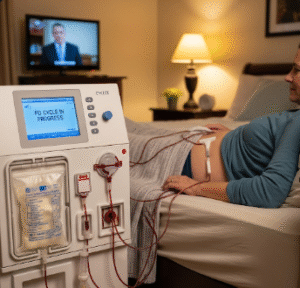What is End-of-Life Care?
End-of-life care refers to medical, emotional, and supportive care provided to patients approaching the final stages of life, usually due to terminal illness, advanced age, or progressive organ failure.
💡 Key aspects of end-of-life care include:
✔️ Symptom management – Pain, shortness of breath, nausea, and anxiety
✔️ Psychological support – For patients and families
✔️ Spiritual care – Respecting beliefs, rituals, and cultural preferences
✔️ Advance care planning – Decisions about treatments, resuscitation, and palliative interventions
In Korea, end-of-life care is integrated into hospitals, hospice centers, and home care services, with a growing emphasis on palliative medicine and patient-centered approaches.
➡️ Focuses on quality of life rather than curative treatment
➡️ Supports physical, emotional, and spiritual needs
➡️ Guides families through complex medical decisions
Why It’s Done / Importance
End-of-life care is provided to ensure comfort, dignity, and support in the final phase of life.
✔️ Manage pain and distressing symptoms – Avoid unnecessary suffering
✔️ Provide emotional and psychological support – Anxiety, depression, or fear of death
✔️ Guide medical decision-making – DNACPR orders, hospice referral, and treatment limitations
✔️ Assist families – Counseling, grief support, and practical guidance
Clinical Benefits:
➡️ Improved patient comfort → Effective pain and symptom control
➡️ Better family experience → Reduces stress and enhances coping
➡️ Ethically appropriate care → Respect for patient autonomy and preferences
➡️ Avoid unnecessary interventions → Focus on meaningful care rather than aggressive treatments
In Korea, end-of-life care is supported by the Act on Hospice and Palliative Care and Decisions on Life-Sustaining Treatment, ensuring patients’ rights to make advance directives and express their wishes.
Alternatives / Complementary Care
End-of-life care can be combined with several complementary approaches:
⭐ Hospice care – Facility-based or home-based, focusing on comfort
⭐ Palliative care – Symptom management for advanced illness even alongside curative treatment
⭐ Complementary therapies – Music therapy, massage, aromatherapy, and relaxation techniques
⭐ Spiritual support – Chaplaincy, meditation, or religious counseling
⭐ Counseling services – For patient and family emotional support
👉 Key Point: End-of-life care is personalized, with medical and complementary approaches tailored to patient and family needs.
Preparation / Considerations
Preparation for end-of-life care involves planning, communication, and legal documentation:
🔹 Advance care planning – Discuss wishes regarding life-sustaining treatment and resuscitation
🔹 Designate a healthcare proxy – Family member or trusted person to make decisions
🔹 Medication review – Optimize pain management and reduce unnecessary drugs
🔹 Environment setup – Home, hospice, or hospital setting based on patient preference
🔹 Family education – Understanding the disease trajectory and care process
⭐ Legal considerations in Korea – Completion of life-sustaining treatment forms and advance directives is encouraged
⭐ Cultural considerations – Respecting Korean family-centered decision-making and traditional practices
How It’s Provided
End-of-life care is delivered through a multi-disciplinary approach:
- Medical Care
✔️ Pain relief – Opioids, NSAIDs, or adjuvant therapies
✔️ Symptom management – Oxygen for breathlessness, antiemetics for nausea, and sedatives for agitation
✔️ Monitoring – Regular assessment of vital signs and comfort levels - Emotional & Psychological Support
🔹 Counseling for anxiety, depression, or existential distress
🔹 Family meetings to discuss care preferences and decisions
🔹 Bereavement support for loved ones - Spiritual & Cultural Care
➡️ Chaplaincy, prayer, meditation, or culturally relevant rituals
➡️ Respecting dietary, religious, and cultural preferences - Setting Options
✔️ Hospice facilities – Specialized inpatient units
✔️ Hospital palliative care units – Integrated with ongoing medical treatment
✔️ Home-based care – Nurses and caregivers provide support at home
Highlights:
✔️ Patient-centered and compassionate
✔️ Multi-disciplinary collaboration – Doctors, nurses, social workers, and chaplains
✔️ Flexible setting – Home, hospital, or hospice based on patient preference
Recovery / Support
Although end-of-life care does not aim to cure, recovery focuses on:
✔️ Relief of physical symptoms – Pain, breathlessness, nausea, fatigue
✔️ Emotional stabilization – Reduce anxiety and provide comfort
✔️ Family support – Counseling, guidance, and bereavement care
✔️ Spiritual peace – Supporting beliefs, rituals, and closure
⭐ Support continues for family members after the patient’s death, helping with grief and adjustment.
Complications / Challenges
End-of-life care faces several challenges:
⚠️ Uncontrolled symptoms – Pain, agitation, or shortness of breath may persist
⚠️ Family disagreements – Conflict over treatment decisions or place of care
⚠️ Emotional distress – Anxiety, depression, or caregiver burnout
⚠️ Resource limitations – Availability of hospice beds or trained staff
⚠️ Cultural barriers – Reluctance to discuss death or DNACPR decisions
➡️ In Korea, training for palliative care teams and clear legislation helps mitigate complications and ensure ethical care.
Treatment and Care Options in Korea
Korea provides comprehensive end-of-life care services through hospitals, hospice centers, and home-based programs:
🏥 Hospice Care Facilities – Specialized centers providing 24/7 symptom management
🏥 Hospital Palliative Care Units – Integrated with oncology, cardiology, or ICU services
🏥 Home-Based Hospice Services – Nurses, social workers, and caregivers provide care at home
🏥 Psychological and Bereavement Support – Counseling for patient and family
🏥 Legal & Advance Directive Assistance – Helps patients complete DNACPR and life-sustaining treatment forms
Why Korea is a Preferred Destination:
✔️ Advanced palliative care services – State-of-the-art facilities with trained multidisciplinary teams
✔️ Legal framework – Ensures patient autonomy and protects rights
✔️ Culturally sensitive care – Balances family involvement and individual wishes
✔️ Accessible home and hospice care – Nationwide availability, including rural areas
Approximate Costs in Korea:
🔹 Hospital Palliative Care Unit → $150 – $400 per day
🔹 Hospice Facility Care → $100 – $300 per day
🔹 Home-Based Hospice Services → $50 – $150 per day
🔹 Counseling and Support Services → $30 – $80 per session
Conclusion
End-of-life care is essential for ensuring dignity, comfort, and support for patients approaching the final stage of life.
It helps:
✔️ Relieve physical suffering
✔️ Provide emotional and psychological support
✔️ Guide families through difficult decisions
✔️ Respect patient autonomy and cultural preferences
In Korea, patients benefit from:
✔️ Advanced hospice and palliative care facilities
✔️ Expert multidisciplinary teams
✔️ Legal frameworks supporting patient choices
✔️ Comprehensive support for patients and families
👉 Key Message: End-of-life care in Korea is compassionate, ethical, and patient-centered, providing comfort, dignity, and support for both patients and their loved ones during life’s final stage.













